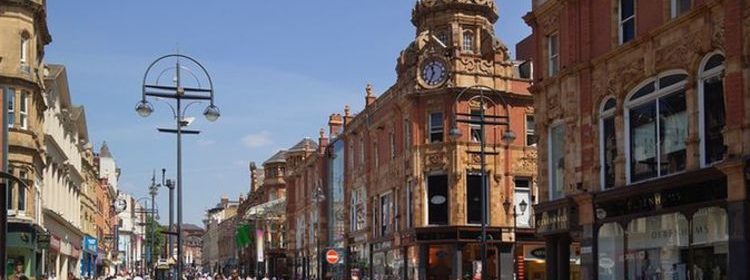Streets ahead- UK highstreet beats EU and leads way with economic recovery

Brexit: 'It's harder to work with the EU' says British retailer
We use your sign-up to provide content in ways you’ve consented to and to improve our understanding of you. This may include adverts from us and 3rd parties based on our understanding. You can unsubscribe at any time. More info
The British Retail Consortium’s data compared 2021 with 2019, year-on-two-years, in order to allow for the significant impact of the pandemic. The results found UK footfall was down 13.7 percent in October with a 3.2 percentage point improvement from September. While still a decline, it’s way ahead of other economies with Spain down 19.8 percent, German down 26.1 percent, Italy down 34.6 percent and France down 34.9 percent. Helen Dickinson, chief executive of the British Retail Consortium, said: “It was great to see the UK leading the way for footfall in October among the major European economies. This gives more retailers a reason to be hopeful as we enter the crucial golden quarter, with many embracing both digital and physical connections with their customers, and indicates that retail is playing a key part in the economic recovery.”
The best news came for retail parks which saw footfall nearly back to pre-pandemic levels.
Part of this may be down to early Christmas spend with many retailers bringing forward Christmas range launches to try to smooth out any supply chain issues ahead of the peak shopping period.
The UK also saw a post-lockdown explosion of demand earlier in the year as people spent spare cash accumulated during the pandemic.
However, evidence suggests this is now starting to wane with previous BRC figures suggesting this started to slow in August.


Other factors explaining the marked difference between the UK and other European countries may also lie in the vaccine programme and the impact of Brexit.
Danni Hewson, AJ Bell financial analyst, said: “While the UK was quick off the mark to get its vaccination programme underway many other European countries dragged their feet.”
“It meant the UK consumer was quicker to feel a boost to confidence which enabled them to return to old habits like hitting the high street.”
“UK retailers also played their part, retaining customers during lockdowns by beefing up their online offer and drawing people back into store with clever marketing and an easy mix of on and offline shopping.”
“There has been a Brexit effect with some consumers deciding to buy British rather than dealing with costly delivery charges or a long wait for items to negotiate the supply chain.”

The picture is not even across the UK though and while many cities have seen significant rises in footfall in recent months the largest such as London, Birmingham and Glasgow have lagged behind.
Ms Dickinson explained: “Lower tourism levels, more working from home and lower usage of public transport due to Covid have disproportionately affected these cities as a result, as well as holding back shopping in city centres across the UK.”
Across the home nations, Northern Ireland saw the lowest declines in footfall down only 10.8 percent.
This was followed by Wales at -13.1%, England at -13.7 and finally Scotland which saw the deepest decline of -17 percent.
DON’T MISS:
Andrew Bailey’s ‘credibility shot’ over interest rates [REACTION]
What Bank of England interest rates update means for YOUR pension [SPOTLIGHT]
Pound plummets following rate decision [ANALYSIS]

Earlier this week high street giant Next reported sales up 17 percent in the last quarter with the company on track for year-end profits of £800 million.
However, chief executive Simon Wolfson warned pent-up demand post lockdown was “likely to continue to diminish” while also adding stock availability remained challenging.
Source: Read Full Article
